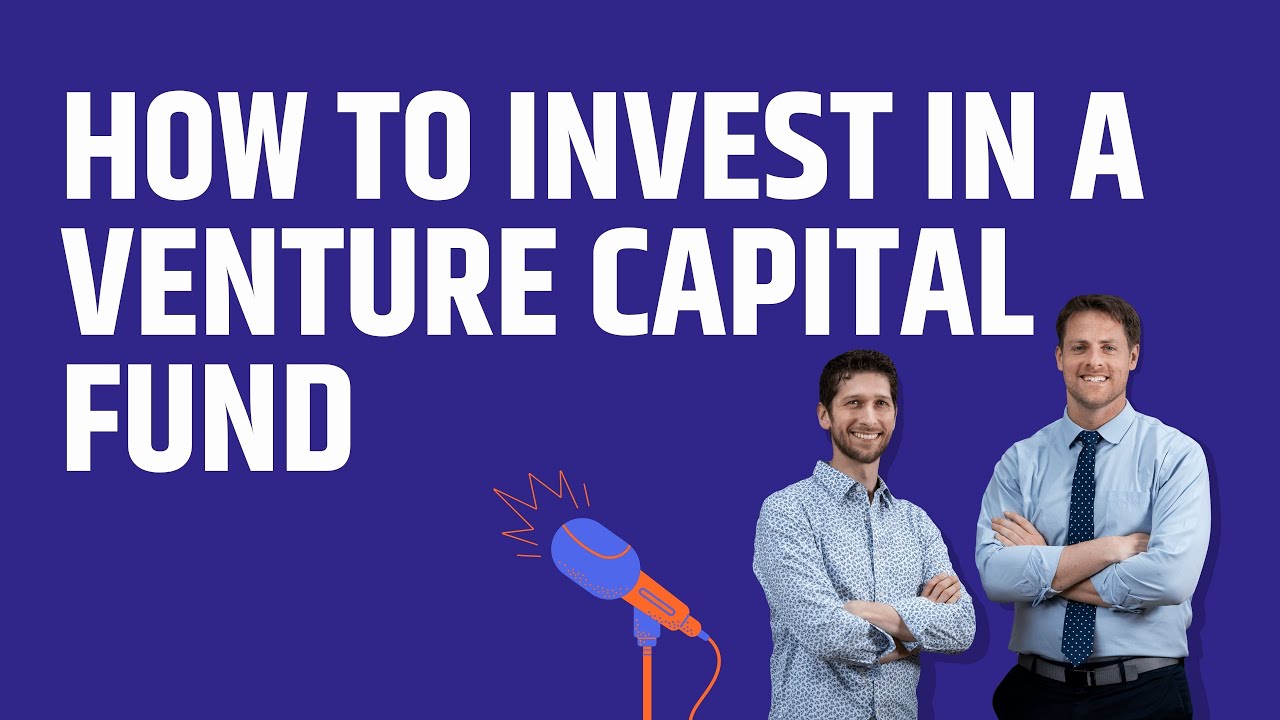What is venture capital? Venture capital is a type of financing that has become increasingly popular in recent years, particularly in the startup world. This type of financing is different from traditional bank loans or other forms of funding, as it typically involves investors taking an equity stake in a company in exchange for funding. Venture capital has played a significant role in the growth and development of some of the world's most successful companies, including Apple, Google, and Amazon.
How Does Venture Capital Work?

Venture Capital EXPLAINED
Venture capital works by providing funding to early-stage companies that have the potential for high growth and returns. Venture capital funds typically pool moneyfrom investors, such as institutional investors, wealthy individuals, and family offices, and use that moneyto make investments in startups.
When a venture capital fund invests in a startup, they typically take an equity stake in the company in exchange for the funding. The venture capital firm will then work closely with the startup, providing guidance and mentorship to help the company grow and succeed.
Venture capital funds typically have a specific investment strategy or focus, such as investing in companies in a particular industry or at a certain stage of development. They may also have specific criteria for the types of companies they are willing to invest in, such as a minimum amount of revenue or a certain level of market traction.
Venture capital funds also typically have a set time horizon for their investments, with most funds aiming to exit their investments within 5-10 years. When the startup reaches a certain level of maturity or growth, the venture capital fund will typically seek to exit its investment by selling its equity stake in the company, either through an initial public offering (IPO) or a sale to another company.
How To Get Into Venture Capital?

How To Get A Job In Venture Capital (From a Former VC!)
Getting into venture capital can be a challenging and competitive process, but there are several steps you can take to increase your chances of success. Here are some tips on how toget into venture capital:
- Gain relevant experience- Venture capital firms typically look for candidates with relevant experience in fields such as investment banking, management consulting, or startup operations. Consider pursuing internships or entry-level positions in these fields to gain relevant experience and build a network of contacts.
- Build a strong network- Networking is crucial in the venture capital industry. Attend industry eventsand conferences, reach out to alumni or other contacts who work in venture capital, and join professional organizations such as the National Venture Capital Association (NVCA) to expand your network.
- Develop relevant skills- In addition to relevant experience, venture capital firms look for candidates with strong analytical, communication, and problem-solving skills. Consider taking courses or pursuing certifications in these areas to develop your skills.
- Start your own company- Starting your own company can be a great way to gain experience and insight into the startup world, and can be seen as a valuable asset by venture capital firms.
- Be persistent and flexible- The venture capital industry is highly competitive, and it may take some time to break in. Be persistent in your job search, and be open to opportunities such as internships or lower-level positions that can help you gain a foothold in the industry.
What Are Venture Capital Funds?
Venture capital funds are investment vehicles that pool capital from investors, such as institutional investors, high-net-worth individuals, and family offices, and use that capital to invest in early-stage companies with high growth potential.
Venture capital funds typically have a specific investment strategy or focus, such as investing in companies in a particular industry or at a certain stage of development. They may also have specific criteria for the types of companies they are willing to invest in, such as a minimum amount of revenue or a certain level of market traction.
When a venture capital fund invests in a company, they typically take an equity stake in the company in exchange for the funding. The venture capital firm will then work closely with the company, providing guidance and mentorship to help the company grow and succeed.
Investing in venture capital funds can be a way for investors to gain exposure to high-growth startups and potentially earn attractive returns. However, investing in venture capital funds is inherently risky, as not all investments will be successful. As such, venture capital funds typically have high minimum investments and require investors to have a high level of risk tolerance.
Well-Known Venture Capital Funds
There are many well-known venture capital funds that have played a significant role in the growth and development of the startup ecosystem. Here are a few examples:
- Sequoia Capital- Founded in 1972, Sequoia Capital is one of the oldest and most well-respected venture capital firms. Sequoia has backed many successful startups, including Apple, Google, LinkedIn, and Airbnb.
- Andreessen Horowitz- Founded in 2009 by techpioneers Marc Andreessen and Ben Horowitz, Andreessen Horowitz has quickly become one of the most prominent venture capital firms in Silicon Valley. The firm has backed companies such as Facebook, Twitter, and Airbnb.
- Kleiner Perkins- Founded in 1972, Kleiner Perkins is another well-known venture capital firm with a long history of successful investments. Kleiner Perkins has backed companies such as Amazon, Google, and Genentech.
- Accel Partners- Founded in 1983, Accel Partners is a global venture capital firm that has backed companies such as Facebook, Dropbox, and Spotify.
- Benchmark Capital - Founded in 1995, Benchmark Capital is a venture capital firm that has backed companies such as Uber, Twitter, and Yelp.
Private Equity Vs. Venture Capital
Private equity and venture capital are both forms of alternative investments that involve investing in private companies, but there are some key differences between the two:
- Investment stage- Venture capital typically invests in early-stage companies that have high growth potential, while private equity firms tend to invest in more mature companies that are seeking to expand or restructure.
- Investment size- Venture capital typically invests smaller amounts of capital in early-stage companies, while private equity firms invest larger sums of capital in more mature companies.
- Risk profile- Venture capital investments are generally considered to be riskier than private equity investments, as early-stage companies have a higher chance of failure. Private equity investments, on the other hand, tend to be less risky but may have a longer investment horizon.
- Exit strategy- Venture capital firms typically aim to exit their investments within 5-10 years, while private equity firms may hold their investments for a longer period of time.
- Ownership and control - Venture capital firms often take a minority ownership stake in the companies they invest in and provide guidance and mentorship to help the company grow. Private equity firms, on the other hand, often take a majority ownership stake in the companies they invest in and may play a more active role in managing the company.
How To Invest In Venture Capital?

How Do I Invest in Venture Capital Funds? (Episode #5)
Investing in venture capital can be a great way to gain exposure to high-growth startups and potentially earn attractive returns. However, investing in venture capital is generally reserved for accredited investors with high net worth and significant risk tolerance, as it is a high-risk, illiquid investment. Here are some ways to invest in venture capital:
- Invest in a venture capital fund- The most common way to invest in venture capital is to invest in a venture capital fund. These funds pool capital from multiple investors and use that capital to invest in early-stage companies. Investors can gain exposure to a diversified portfolio of startups by investing in a venture capital fund.
- Invest in a private equity fund of funds- Private equity fund of funds is an investment vehicle that invests in a portfolio of private equity funds, including venture capital funds. These funds can offer diversified exposure to the private markets, including venture capital.
- Invest in a publicly traded venture capital firm- Some venture capital firms, such as the ones listed in public stock exchanges, may offer publicly traded shares that can be purchased by individual investors.
- Angel investing- Accredited investors can also invest directly in early-stage companies as angel investors. This typically requires significant due diligence and research to identify potential opportunities.
Before investing in venture capital, it's important to understand the risks and potential rewards of this type of investment. It's also important to have a clear investment strategy and to work with a qualified financial advisor or investment professional who can help assess the risks and opportunities of this type of investment.
History Of Venture Capital

Venture Capital | How Startup Funding Began (Short Documentary)
The history of venture capital can be traced back to the early 20th century when wealthy individuals began investing in innovative companies and entrepreneurs. However, the modern venture capital industry as we know it today began to take shape in the mid-20th century.
In the post-World War II era, a group of investors known as "the Boston Angels" began investing in early-stage companies in the Boston area. In 1946, the first venture capital firm, American Research and Development Corporation (ARDC), was founded by Georges Doriot, a Harvard BusinessSchool professor and a former executive at the Radio Corporation of America (RCA). ARDC was focused on investing in early-stage technology companies and became one of the most successful venture capital firms of its time.
Throughout the 1960s and 1970s, venture capital continued to grow as an industry, with the formation of many new firms and the expansion of the industry beyond the Boston area. In 1972, Sequoia Capital was founded in California and quickly became one of the most successful venture capital firms in the industry. Other prominent firms, such as Kleiner Perkins, were also founded during this time period.
In the 1980s, venture capital began to attract more institutional investors, such as pension funds and endowments, which helped to fuel the growth of the industry. The 1980s also saw the rise of the Silicon Valley technology boom, which led to a surge of successful venture-backed companies, such as Apple, Microsoft, and Intel.
The 1990s saw a shift in the focus of venture capital, as investors began to focus more on Internet and software companies. This led to the formation of many new venture capital firms focused on these sectors, such as Benchmark Capital and Accel Partners.
In the 2000s, the venture capital industry faced significant challenges, including the bursting of the dot-com bubble and the global financial crisis. However, the industry has continued to grow and evolve, with new trends such as impact investing and the rise of international venture capital firms. Today, venture capital is a vital part of the global economy, providing capital and support to entrepreneurs and innovative companies around the world.
Types Of Venture Capital
- Seed funding- This is the earliest stage of venture capital investing, in which capital is provided to help a company get off the ground. Seed funding is typically used to fund the development of a product or service and to hire initial staff.
- Early-stage funding- Early-stage funding is provided to companies that have established a product or service and are looking to scale their business. This type of funding is often used to finance product development, marketing, and operations.
- Later-stage funding- Later-stage funding is provided to companies that are more established and have a proven track record of success. This type of funding is typically used to finance expansion, acquisitions, or other strategic initiatives.
- Mezzanine funding- Mezzanine funding is a form of debt financing that is used to finance the growth of a company. This type of financing typically has a higher interest rate than traditional bank loans and is often used to finance acquisitions or other strategic initiatives.
- Venture debt- Venture debt is a form of debt financing that is used to finance the growth of a company. Unlike mezzanine funding, venture debt typically has lower interest rates and is often used to finance specific projects or initiatives.
- Corporate venture capital- Corporate venture capital is provided by corporations to startups in order to gain exposure to new technologies or business models. This type of venture capital is often used to help corporations stay on the cutting edge of their industries.
- Angel investing- Angel investors are individuals who provide capital to startups in exchange for an equity stake in the company. Angel investors typically invest smaller amounts of capital than venture capital firms and may be more focused on the potential social or environmental impact of the company.
The Venture Capital Process
The venture capital process typically involves several stages, each of which is designed to help investors identify and evaluate promising startup companies, and to provide the funding and support necessary to help those companies grow and succeed. Here are the basic steps in the venture capital process:
- Sourcing- The first step in the venture capital process is sourcing, or identifying potential investment opportunities. Venture capitalists use a variety of methods to find promising startups, including networking, attending industry events, and reviewing business plans and pitches.
- Due Diligence- Once a potential investment opportunity has been identified, the venture capitalist will conduct due diligence, which involves a thorough investigation of the startup's business model, market potential, and management team. This process may also include interviews with customers and industry experts, as well as a review of the startup's financial statements.
- Negotiation- If the venture capitalist decides to move forward with the investment, the next step is negotiation. This typically involves setting the terms of the investment, including the amount of capital to be invested, the equity stake that the investor will receive in the company, and any other conditions or requirements.
- Investment - Once the terms of the investment have been agreed upon, the venture capitalist will provide the funding to the startup. This may be done in a single round of funding, or through a series of rounds as the company grows and requires additional capital.
- Value Creation- Once the startup has received funding, the venture capitalist will work closely with the management team to help create value and drive growth. This may involve providing strategic guidance, introducing the startup to potential customers or partners, or providing operational support.
- Exit- The final step in the venture capital process is the exit, in which the venture capitalist realizes their return on investment. This may occur through an initial public offering (IPO), acquisition by another company, or a management buyout.
What Degree Is Best For Venture Capital?

Is a Career in Venture Capital Right for You?
There is no specific degree that is considered "best" for a careerin venture capital, as the industry values a wide range of skills and backgrounds. However, here are some degrees that may be particularly relevant or useful for those interested in pursuing a career in venture capital:
- Business- A degree in business, such as a Bachelor of Business Administration (BBA) or a Master of Business Administration (MBA), can provide a strong foundation in finance, accounting, and management, which are all important skills for a career in venture capital.
- Finance- A degree in finance, such as a Bachelor of Science in Finance or a Master of Science in Finance, can provide a deep understanding of financial markets, investments, and risk management, which are all important skills for a career in venture capital.
- Engineering- A degree in engineering, such as a Bachelor of Science in Engineering or a Master of Science in Engineering, can be particularly useful for venture capital firms that focus on investing in technology startups, as it provides a strong technical background and understanding of emerging technologies.
- Computer Science- A degree in computer science, such as a Bachelor of Science in Computer Science or a Master of Science in Computer Science, can also be useful for venture capital firms that focus on investing in technology startups, as it provides a deep understanding of programming, software development, and other technical skills.
- Law- A degree in law, such as a Juris Doctor (JD), can be helpful for venture capitalists who are involved in negotiating deals and drafting legal agreements, as it provides a deep understanding of contract law and other legal principles.
Venture Capital Salary
Venture capital salaries can vary widely depending on the role, location, and firm. Here are some general salary ranges for common roles in venture capital:
- Analyst- Venture capital analyst salaries typically range from $70,000 to $120,000 per year, with an average salary of around $90,000. This can vary depending on the size and location of the firm, as well as the level of experience and qualifications of the analyst.
- Associate- Venture capital associate salaries typically range from $120,000 to $200,000 per year, with an average salary of around $150,000. Again, this can vary depending on the size and location of the firm, as well as the level of experience and qualifications of the associate.
- Partner- Venture capital partner salaries can range from several hundred thousand dollars to several million dollars per year, depending on the size and success of the firm. Partners typically receive a percentage of the profits generated by the fund, as well as a management fee.
It is worth noting that compensation in venture capital often includes not just base salary, but also bonuses and carried interest, which is a percentage of the profits earned by the fund. Additionally, many firms offer other perks and benefits, such as equity in portfolio companies and opportunities for professional development and networking.
What Are The Advantages And Disadvantages Of Venture Capital?
Venture capital has several advantages and disadvantages for both entrepreneurs and investors. Here are some of the main ones:
Advantages For Entrepreneurs
- Access to Capital- Venture capital provides entrepreneurs with access to large amounts of capital that they may not be able to obtain from other sources, such as bank loans or personal savings.
- Strategic Support- Venture capitalists often bring a wealth of experience and expertise to the table, including industry knowledge, management expertise, and access to valuable networks. This can help entrepreneurs make better strategic decisions and navigate challenges more effectively.
- Accelerated Growth- With the right support and funding, entrepreneurs can often accelerate the growth of their businesses much more quickly than they would be able to on their own.
Disadvantages For Entrepreneurs
- Loss of Control- In exchange for funding, venture capitalists typically take an equity stake in the company and may require a seat on the board of directors. This can lead to a loss of control for the entrepreneur.
- High Expectations- Venture capitalists expect high returns on their investment, which can put pressure on entrepreneurs to achieve rapid growth and profitability.
- Potential for Conflict - If the investor and entrepreneur have different visions for the company's future, there can be conflict and tension between them.
Advantages For Investors
- High Returns- Venture capital investments have the potential to generate high returns, particularly if the company experiences rapid growth and goes public or is acquired.
- Diversification - Venture capital investments can help investors diversify their portfolios and reduce their overall risk.
- Access to Promising Startups- Venture capitalists often have access to promising startups and early-stage companies that are not yet publicly traded.
Disadvantages For Investors
- High Risk- Venture capital investments are inherently risky, as many startups fail to generate returns or even go out of business.
- Illiquidity- Venture capital investments are often illiquid, meaning that it can be difficult to sell the investment or get access to the capital until the company goes public or is acquired.
- Long Time Horizon- Venture capital investments often require a long time horizon, as it can take several years for a company to reach maturity and generate returns.
People Also Ask
What Are The Typical Fees Charged By Venture Capital Firms?
Venture capital firms typically charge two types of fees: management fees and carried interest. Management fees are typically 2% of the total amount of capital raised and are used to cover the firm's operating expenses. Carried interest is typically 20% of the profits made on the investment.
How Do Venture Capital Firms Make Money?
Venture capital firms make money by investing in startups that have the potential for high returns, and then selling their stake in the company at a profit. They also charge fees for managing the fund, as well as carried interest on the profits made from the investment.
What Is The Role Of A Venture Capitalist?
The role of a venture capitalist is to identify promising startups and provide funding and support to help them grow and succeed. This includes providing guidance and mentorship, as well as introducing them to potential customers and partners.
How Do Startups Get Funding From Venture Capitalists?
Startups can get funding from venture capitalists by pitching their business idea and demonstrating the potential for high growth and returns. This typically involves creating a business plan, developing a prototype or minimum viable product, and presenting it to investors who are interested in investing in the company.
Conclusion
Venture capital is a crucial component of the startup ecosystem, providing funding and support to innovative companies that have the potential to revolutionize industries and change the world.
While investing in startups is inherently risky, venture capital offers the potential for high returns that can outweigh the risks for investors who are willing to take on the challenge. As the startup world continues to grow and evolve, venture capital is likely to remain an essential part of the financing landscape for years to come.
